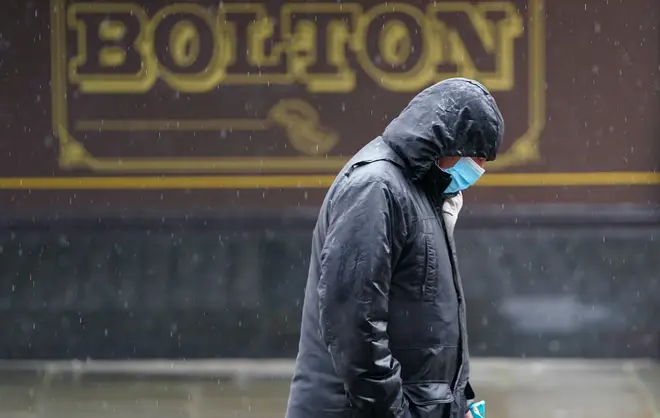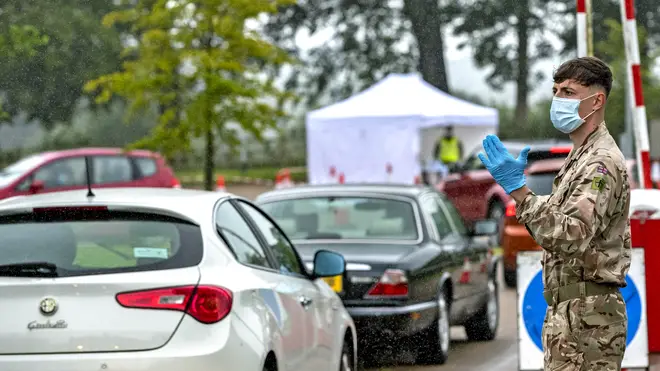
Dean Dunham 9pm - 10pm
14 May 2021, 11:01

The Indian variant has caused concern among scientists and politicians hoping to ease coronavirus restrictions on Monday and later in June.
Pubs and cinemas are due to reopen indoors on Monday for the first time since September, with the number of new infections, hospitalisations and death down significantly following a surge in January.
But the new 'variant of concern' has sparked panic among some scientists, who are rapidly researching how fast it is spreading and the impact it may have on the effectiveness of vaccines.
But what do we know about the variant so far? How fast is it spreading? Where are most of the cases?

Surge testing is under way in parts of the North West of England where cases involving the Indian variant of coronavirus are on the increase.
The "variant of concern" has been detected in Bolton in Greater Manchester, as well as in Blackburn with Darwen in Lancashire, Sefton in Merseyside and London - most of which have all seen rates rise rapidly.
In Bolton, the area with the highest rate of cases, with 553 new infections in the seven days to May 9, mobile testing units have been deployed and door-to-door PCR Covid testing has been offered to 22,000 residents.
In Wales, 17 cases of the variant have been identified so far, with concerns that travel links between north east Wales and north west England could be accelerating the spread.
READ MORE: Hancock says he ‘will not hesitate to take further action’ as Indian variant cases surge
READ MORE: Boris Johnson 'ruling nothing out' amid worries about delay to roadmap
#COVID19 #JCVI #Indian #Variant 2/2
— Dominic Harrison (@BWDDPH) May 13, 2021
If the government stops areas with high #IndianVariant cases form 'surge vaccinating' target areas (which will contribute to reduced transmission) - it will reduce our local capacity to control spread.
"I hold this truth to be self evident.." https://t.co/jXctbb3d2x
Ministers are concerned about the rolling average for infections, which shows a 12.4% rise in the seven days to Thursday.
While cases in most areas free from the Indian variant continue to to fall, those where the variant has been detecting have significantly increased.
In the same period, hospital admissions were down by 7.9% but a delay in infections to hospitalisations makes it unclear whether the rise in cases will make a difference.
Blackburn with Darwen's director of public health, Professor Dominic Harrison, said on Twitter that the authority had asked the NHS to "surge vaccinate" to protect as many people as possible but the request was refused.
Additional vaccine doses have been sent to Bolton and Blackburn with Darwen to continue their regular rollouts, while 800,000 PCR tests have been sent to 15 separate areas of the England, including parts of London and Merseyside.
A vaccine bus has also been set up in the Greater Manchester town to increase uptake among those who are eligible, including a rapid response team of 100 nurses, public health advisers and environmental health officers.
The hope is that the effect of the vaccine will stop most people from becoming seriously ill with the virus.
READ MORE: Additional vaccine clinics set up in Blackburn amid concerns over Indian variant
The vaccine bus is out again today at @EssaAcademy from 10am-4pm for people living or working in the BL3 area if they meet the following criteria
— Bolton GP Federation (@boltongpfed) May 14, 2021
aged 38 & over
OR
aged 16 + AND have been shielding, have a long term condition, or are a carer.
1st doses only.
Help stop the spread pic.twitter.com/bkXGK6PEsG
The Indian variant - also known as B.1.617.2 - is being studied closely by virologists to establish whether it is causing more disease in those infected compared to other variants seen in South Africa, Brazil and Kent.
So far, no such evidence is clear but there are fears the variant could result in more people needing urgent hospital treatment.
There are also concerns that it could bypass the immunity afforded by vaccines.
But there is no evidence to suggest either is the case at the moment.
READ MORE: Government urged to protect children by keeping schools open in any future lockdowns

'No evidence' Indian variant delivers a more severe disease
Prime Minister Boris Johnson has ruled nothing out, including a delay in easing restrictions in May and June, if the variant is proven to be more dangerous than the others.
The PM told reporters yesterday: "At the moment there is a very wide range of scientific opinion about what could happen.
"We want to make sure we take all the prudential, cautious steps now that we could take, so there are meetings going on today to consider exactly what we need to do.
"There is a range of things we could do, we are ruling nothing out."
Vaccines minister Nadhim Zahawi stressed on Friday that the 'four tests' must be met for the 21 June easing and warned there could be a delay if variants or infection rates become a problem.
Asked if there is a possibility easing could be paused, he told LBC: "The way we don't have to do that is by everybody doing their bit, by taking the two tests a week, doing your PCR test in those areas, and to isolate, isolate, isolate.
"We have got to break the cycle of infection, because one of those big tests was infection rates have to be suppressed, and the other big test is variants.
"If those cause a problem, then the tests will fail. The four tests have to be met for 21 June."
Welsh First Minster Mark Drakeford said on Friday that officials have "decided to hold back" on relaxing some lockdown restrictions in Wales on Monday until
Wales will move to alert level two on Monday with the reopening of indoor hospitality and entertainment venues.

Boris Johnson 'anxious' about the spread of the Indian variant
The Government has so far not ruled out reintroducing localised restrictions in England.
Greater Manchester Mayor Andy Burnham, who fought ministers over such restrictions last year, said he would not welcome local lockdowns to combat the spread of the Indian coronavirus variant.
But the PM has hinted they could return if the number of cases spirals out of control in specific areas.